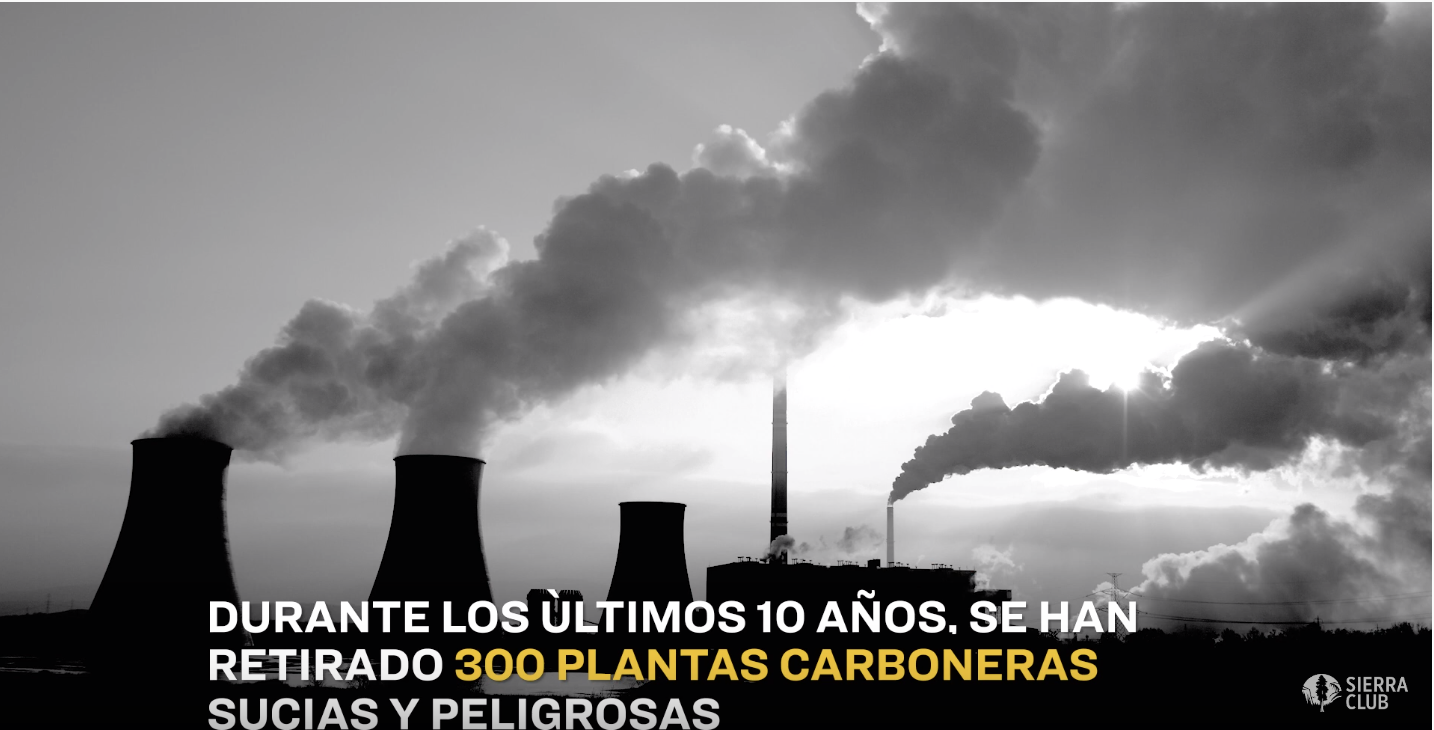(English follows)
Desde entonces, el Sierra Club y sus aliados han organizado a miles de comunidades, organizaciones médicas y grupos de defensa de los consumidores para exigir rendición de cuentas a los dueños de las plantas carboneras por la contaminación que generan, e influenciado a las compañías eléctricas y proveedores energéticos para que hagan la transición a recursos más limpios y baratos, como las energías solar, eólica; la eficacia energética, y el almacenamiento en baterías.
La ciencia médica nos dice que retirar solo una planta carbonera evita 408 ataques de asma, 38 ataques cardíacos y 25 muertes prematuras al año, lo cual hace el anuncio de hoy especialmente impactante para las comunidades y familias que sufren las consecuencias médicas más severas debido a la contaminación de la industria carbonera. En una notable progresión desde los humildes orígenes del movimiento Más Allá del Carbón, la generación de electricidad carbonera ahora significa solo un cuarto del mercado nacional energético, la industria carbonera se ha reducido dramáticamente en tamaño e influencia, y la economía de energía limpia avanza en todo Estados Unidos.
Incluso ante el antagonismo de la administración Trump, la Campaña Más Allá del Carbón y sus aliados han sido capaces de asegurarse del retiro de 62 plantas carboneras desde que Donald Trump llegó a la Casa Blanca, al mismo tiempo que se opuso a los intentos de debilitar las protecciones contra la contaminación carbonera. La Campaña Más Allá del Carbón ha logrado evitar gracias al retiro de estas plantas carboneras 8.001 muertes prematuras, 12.435 ataques cardíacos, 131,713 ataques de asma y $3.800 millones en costos a la salud pública.
Como respuesta, la directora de rango de la Campaña Más Allá del Carbón del Sierra Club, Mary Ann Hitt, emitió la siguiente declaración:
“Este retiro número 300 de nuestra Campaña Más Allá del Carbón es un gran logro y una importante invitación a actuar. Como organización democrática y de base, sabemos que este hito es la culminación de decenas de miles de horas de trabajo por parte de miles de voluntarios, activistas, abogados, expertos en salud, economistas y dedicados líderes comunitarios. Es gracias a ellos que se evitan 8.000 muertes al año, y que hemos alcanzado grandes logros en la crisis climática. Aún así, queda mucho trabajo por hacer.
“230 plantas carboneras aún siguen contaminando el aire, agua y clima, poniendo miles de vidas en peligro. Todavía quedan mineros del carbón activos y retirados que necesitan verdadero apoyo para lograr que sus compañías respeten su cuidado de salud, pensiones y obligaciones financieras que deben a sus trabajadores. Y todavía quedan programas que deben desarrollarse e implementarse para ayudar a ex mineros del carbón y sus familias para abandonar la industria de combustibles fósiles. Estos problemas todavía están frente a nosotros y necesitan soluciones reales y justas. Pero sabemos cómo confrontarlos”.
(English)
With the Retirement of Dolet Hills, Sierra Club’s Beyond Coal Campaign Retires 300th Coal Plant Since 2010
WASHINGTON, D.C. - Arkansas PSC approved the retirement of the Dolet Hills Power Station today, in a settlement with Southwestern Electric Power Company (SWEPCO), making it the 300th coal plant proposed to retire since the beginning of Sierra Club’s Beyond Coal campaign. Dolet Hills’ retirement symbolizes an important milestone for Beyond Coal, which began in 2010 with 530 active coal plants, a robust and influential coal industry, and a fledgling clean energy economy.
Since then, Sierra Club and its allies have organized thousands of communities, medical organizations, and consumer accountability groups to hold coal plant owners accountable for the pollution they create and pushed local utilities and power providers to transition to cleaner, cheaper power generation resources like solar, wind, energy efficiency, and battery storage.
Medical science estimates that retiring just one coal plant prevents 408 asthma attacks, 38 heart attacks, and 25 premature deaths annually, which makes today’s 300th announcement especially impactful to communities and families that suffer from the most severe health consequences of the coal industry’s toxic pollution. In a remarkable progression from the Beyond Coal movement’s humble beginnings, coal based electricity generation now counts for less than a quarter of America’s energy market, the coal industry has dramatically shrunk in both size and influence, and the United States’ clean energy economy is ascendant.
Even in the face of an antagonistic Trump Administration, the Beyond Coal campaign and its allies have been able to secure the retirement of 62 coal plants since Donald Trump was elected to the Oval Office, while also successfully challenging attempts to rollback important accountability standards for the coal industry. Today, the Beyond Coal campaign credits the coal plant retirement movement with the annual prevention of 8,001 premature deaths, 12,435 heart attacks, 131,713 asthma attacks, and $3.8 billion in healthcare costs.
In response, Mary Anne Hitt, Senior Director of Sierra Club’s Beyond Coal campaign, released the following statement:
“This 300th coal plant retirement of our Beyond Coal campaign is both a great accomplishment and an important call to action. As a democratic, grassroots lead organization, we know that this milestone is the culmination of tens of thousands of hours of work by thousands of volunteers, campaigners, lawyers, health experts, economists, and dedicated community leaders. It’s because of them that 8,000 lives are now saved each year, and that we’ve made real strides toward addressing the climate crisis. However, there is still much more work to be done.
“230 coal plants are still out there polluting our air, water, and climate - putting thousands of lives at risk. There are still current and former coal miners out there that need real support holding coal companies accountable to the healthcare, pension, and mine reclamation obligations that they owe to their workers. And there are still programs that must be developed and implemented to help former coal miners and their families transition out of the fossil fuel industry. These problems are still in front of us, and they still need real and fair solutions - and we are up to the challenge.”
